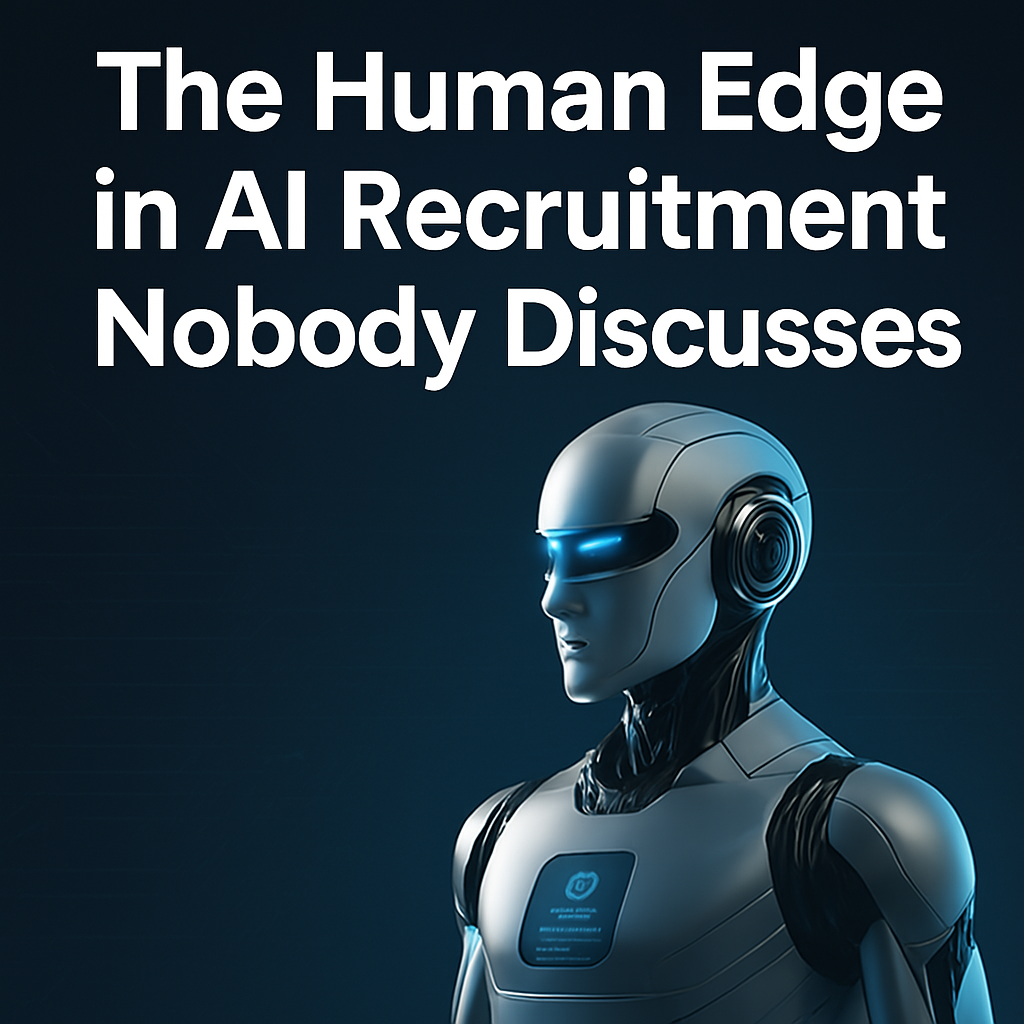
The Human Edge In AI Recruitment Nobody Discusses
The Human Edge In AI Recruitment Nobody Discusses
Last month, I watched a fully automated recruitment system process 500 applications in minutes. I was impressed—until I realized it had rejected every candidate with a non-traditional career path.
Including people like me.
As someone who started in Yellow Pages sales before pivoting to recruitment, I would have been filtered out by most AI systems we see today. That moment crystallized something I've observed across hundreds of small and medium-sized staffing firms: we're asking the wrong question about AI in recruitment.
The question isn't whether human touch is becoming obsolete. It's about understanding where human judgment becomes more valuable, not less, in an AI-powered world.
AI Doesn't Want Your Job—It Wants Your Paperwork
Over my career transitioning from traditional recruitment methods to developing AI-powered solutions, I've identified a fundamental truth: the parts of recruitment most ripe for automation are the parts most recruiters hate anyway.
Parsing hundreds of resumes? Scheduling initial screenings? Sending follow-up emails? These tasks consume up to 70% of a recruiter's workday yet deliver minimal value. This is where AI in recruitment truly shines—not by replacing the recruiter but by reclaiming their time.
When we implemented our first AI recruitment screening tool, our recruiters initially feared job obsolescence. Six months later, they couldn't imagine working without it. Their productivity doubled, but more importantly, the nature of their work transformed. They were spending more time actually talking to promising candidates and clients, not drowning in administrative tasks.
The most successful smaller staffing firms don't view AI as a replacement technology. They see it as an amplification technology.
The Three Recruitment Tasks AI Can't Master (Yet)
In developing AI systems for dozens of recruiting operations, I've found three areas where human skills remain indispensable:
First, nuanced assessment of cultural fit. AI can flag potential matches based on keywords and patterns, but it can't read body language during an interview or sense a candidate's genuine enthusiasm. It can't tell when someone seems right on paper but gives off concerning vibes in person.
Second, relationship building. Recruiting is fundamentally about trust—both with clients and candidates. AI can nurture leads through automated touchpoints, but it can't grab coffee with a passive candidate it's been courting for months or reassure a nervous hiring manager about a non-traditional choice.
Third, contextual adaptation. When market conditions change suddenly (as we all experienced during the pandemic), humans can pivot recruitment strategies intuitively. AI recruitment platforms need time and data to recognize and adapt to new patterns.
The mistake many tech evangelists make is treating these human capabilities as bugs to be fixed rather than features to be enhanced.
The Hybrid Approach That's Winning
Through our work implementing AI CRM solutions in staffing firms, we've found that the most successful approach isn't human-only or AI-only—it's a thoughtfully designed hybrid model.
In this model, AI handles initial candidate sourcing and engagement at scale. It monitors job boards, reaches out to potential matches, conducts preliminary screenings, and schedules promising candidates for human review. Meanwhile, human recruiters focus on high-value activities: deepening relationships with hiring managers, conducting nuanced evaluations of shortlisted candidates, and closing deals.
I made a critical mistake in my early AI in recruitment implementations. I tried to automate entire recruitment workflows end-to-end. The results were technically impressive but practically disappointing. Now we map workflows carefully, identifying where human judgment adds the most value and designing our systems accordingly.
The staffing firms seeing the greatest ROI from AI CRM platforms aren't necessarily using the most sophisticated technology. They're simply the most thoughtful about the human-machine division of labor.
Why Small Firms Have The AI Advantage
Contrary to conventional wisdom, smaller recruitment and staffing operations often implement AI more successfully than their enterprise counterparts. Why? Because they're forced to be strategic rather than comprehensive in their approach.
A regional staffing firm can't afford to implement AI across their entire operation at once. Instead, they typically start with a single high-value use case—perhaps automating initial candidate outreach for their highest-volume roles. This focused approach leads to faster ROI, creates internal champions, and builds organizational confidence.
Large enterprises, meanwhile, often get bogged down in complex, multi-year AI transformation initiatives that attempt too much at once.
The most successful small and mid-sized staffing firms in the AI era share a common trait: they don't try to mimic the comprehensive approaches of enterprises. They identify specific competitive disadvantages they face against larger players, then use targeted AI implementations to level the playing field in those areas.
The Real AI Transformation in Recruitment
The profound change happening in our industry isn't the replacement of humans with machines. It's the evolution of the recruiter's role from administrative processor to strategic talent advisor.
When implemented thoughtfully, AI doesn't diminish the human element in sales and recruitment—it amplifies it. By handling repetitive tasks at scale, AI creates space for the distinctly human aspects of recruitment to flourish.
The future belongs to recruiters who understand that AI isn't coming for their jobs—it's coming for the parts of their jobs that never should have been human work to begin with.
